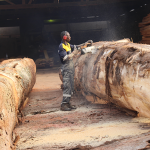timber Industry
Building capacity for legality compliance
Overview
In general, SMEs in Ghana are believed to contribute about 70% to total GDP and account for about 92% of businesses. These groups however have disorganized organizational set-up and poor networking. These challenges are hindering proper monitoring of their operations making them less efficient. The SMEs in the timber sector, are no exception. Despite their recognized role in development of the local economy, Timber SMEs are also viewed as major culprits of illegal logging and associated illegal trade in the timber sector. The implementation of the FLEGT-VPA processes has greatly revealed this weakness (capacity). This is because, the SMFEs in the west Africa sub-region are finding it difficult to comply with the legal regulation. Although the timber industry has benefited from FLEGT/VPA program assistance over the years, there is the realization by stakeholders that, support to industry must increase for its successful implementation.
Why it matters
There is a general consensus that, the performance of SMFEs is important for both economic and social development of developing countries. Generally, they play an important role in national development by accelerating the achievement of wider economic and socio-economic objectives, including poverty alleviation (Cook and Nixson, 2000). They are potential sources of employment and income generation. Specifically, the Small and Medium Forest Enterprises in Ghana are viewed to be a characteristic feature of the production landscape and have been noted to be able to provide about 70000 of manufacturing employment of Ghana (Steel and Webster, 1991; Aryeetey, 2001). It is argued, small-scale production units can promote a more equitable distribution of income than large firms.
What NDF is doing
Through various donor funded projects, NDF is working to assist the small and medium scale forest enterprises to effectively organize and meet regulatory requirements regarding timber company operations. NDF also provides capacity building training on vital sections such as safety and health for these SMEs.






